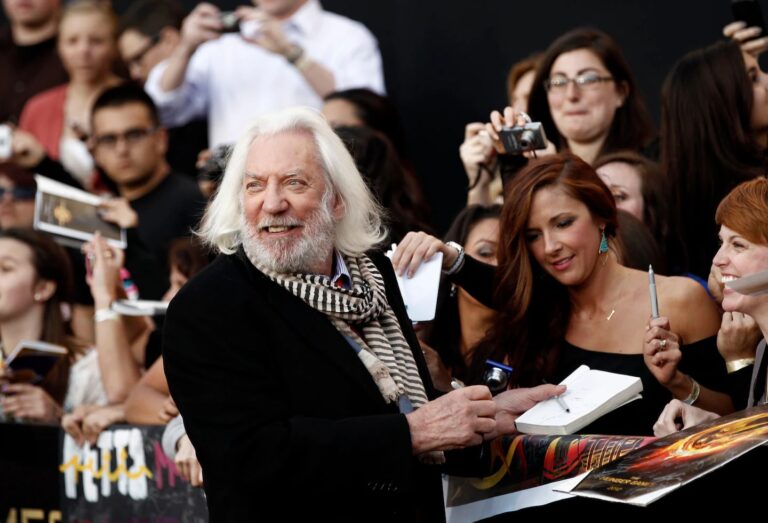Donald Sutherland, whose remarkable versatility as an actor allowed him to portray characters ranging from endearing to menacing, died on Thursday at the age of 88. His son, Kiefer Sutherland, announced the death on social media, though he did not specify the time, place, or cause of death. CAA, Sutherland’s agency, confirmed the news, noting that he passed away in Miami after a long illness.
With a career spanning over six decades, Sutherland appeared in nearly 200 films and television shows, becoming a prominent figure in both Hollywood and international cinema. Known for his distinctive long face, droopy eyes, protruding ears, and wolfish smile, Sutherland’s unique appearance was once described by his mother as having “a lot of character.” Despite this unconventional look, he captivated audiences with his ability to transform into a myriad of roles, from laid-back characters to unsettling villains.
Born on July 17, 1935, in Saint John, New Brunswick, Canada, Sutherland faced numerous health challenges during his childhood, including hepatitis, rheumatic fever, and polio, which left him with one leg shorter than the other. He initially studied engineering at the University of Toronto, but his passion for acting led him to the London Academy of Music and Dramatic Art. After a year, he left to pursue stage work with provincial repertory companies in England, and he also made appearances on British television.
Sutherland’s early film roles often cast him as an artistic homicidal maniac, but his breakthrough came with the 1967 film “The Dirty Dozen,” where he played Vernon Pinkley. This role, along with his portrayal of Capt. Benjamin Franklin “Hawkeye” Pierce in Robert Altman’s “MASH” (1970), catapulted him to fame. His performance in “MASH” highlighted his ability to combine irreverence with a deep anti-authoritarian spirit, which resonated with audiences during the Vietnam War era.
Throughout the 1970s, Sutherland continued to build his reputation with roles in films such as “Klute” (1971), where he played a detective opposite Jane Fonda’s call girl character. The two had an off-screen relationship, which fueled Sutherland’s antiwar activism. He joined Fonda and other actors in the F.T.A. (Free the Army) comedy troupe, performing satirical sketches with a clear anti-Vietnam War message.
Sutherland’s versatility shone in a variety of genres. In Bernardo Bertolucci’s epic “1900” (1976), he played a sadistic fascist, and in Nicolas Roeg’s “Don’t Look Now” (1973), he delivered a haunting performance as a grieving father. His portrayal of Calvin Jarrett in Robert Redford’s “Ordinary People” (1980) demonstrated his capacity for emotional depth, earning critical acclaim for his role as a father struggling with the loss of his son.
Despite his impressive body of work, Sutherland never received an Academy Award nomination. However, he earned other accolades, including a 1995 Emmy for his role in HBO’s “Citizen X” and two Golden Globes for “Citizen X” and “Path to War” (2002).
Sutherland’s career remained robust well into his later years. He appeared in films such as “The Italian Job” (2003), “Pride & Prejudice” (2005), and “The Hunger Games” series (2012-2015), where he played the chilling President Coriolanus Snow. His television work included roles in “Crossing Lines,” “Trust,” and “The Undoing.”
Sutherland’s personal life saw him married three times, always to actresses: Lois Hardwick, Shirley Douglas, and Francine Racette, whom he married in 1990. He is survived by his wife Francine, his sons Kiefer, Roeg, Rossif, Angus, and his daughter Rachel. He also leaves behind several grandchildren.
Sutherland’s dedication to his craft and his ability to surrender his will to directors made him a beloved figure among filmmakers and audiences alike. Reflecting on his career, he often spoke of his profound admiration for the directors he worked with, particularly Federico Fellini, whom he described as “the best experience of my life.” His legacy as a chameleon-like actor who could effortlessly switch between genres and roles ensures that he will be remembered as one of the greats in cinematic history.

